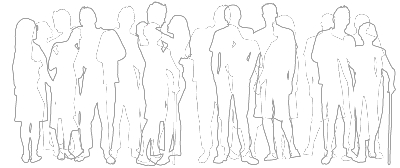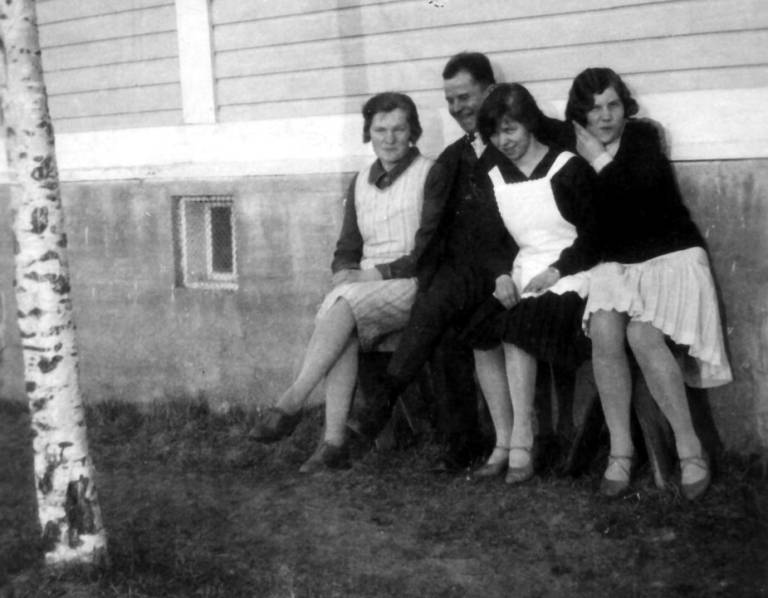
“Affect is a word one cannot avoid hearing at academic discussion. Yet what is meant when the term is being employed?”
Alustus! To put it in a simple way, ‘affect’ is often understood as referring to bodily changes or sensations. However, the content of the term varies depending on who is using it and what is their discipline. The researchers who have an interest in researching with ‘affect’ often stems from the point that it enables a focus on non-verbal processes and the possibility of non-verbal knowledge.
Affects do not reside in individual bodies even though they are embodied. Thus, the attention is directed towards bodies relating to each other (Knudsen & Stage 2015, 2, 5). With this orientation to relations, the use of concepts such as flows and energies in relation with bodies becomes important. Taking affects into consideration provides important ways of understanding sexuality and gender, for example.
There is quite a lot of research about affects, which tends to be more theoretical than empirical. Empirical research using the concept of affect requires developing methodological tools which are sensitive to the non-verbal and intercorporeal processes. The conventional qualitative methods, in turn, tend to focus on the structures of signification and content, that is the verbal and visible instead of affective processes (Knudsen & Stage 2015, 2; Blackman & Venn 2010, 9).
Affect draws attention to something which has not been a common academic focus of interest. Therefore, researching affects poses a need for re-thinking the existing methods (Knudsen & Stage 2015, 7). The researcher is faced with a question: how to research sensations, feelings, memory and listening? (Blackman & Venn 2010, 8). To tackle the challenges posed by researching affects, the workshop Affect & Methods was organized in Tampere, in May 23–24. This introductory article is based on that workshop.
Affect: some background and discussion
‘The affective turn’ is like a buzzword which tries to describe the current interest in researching affects. It should be noted that the ‘turn’ denotes, as Lisa Blackman said in her keynote lecture (May 23, 2016), turning away from something which can possibly be worth keeping. Affective turn is also a turn to revisiting older ideas, which opens a new path of enquiry as Patricia Clough noted in her public lecture to the audience (May 24, 2016). The following text is based on the two keynote lectures and academic literature.
Writers like Jacques Derrida and Gilles Deleuze and feminist re-readings of Baruch Spinoza, Henri Bergson, Sigmund Freud, to name a few, have made important contributions to the field of affect studies. The 1990s brought the fields of microbiology, genomics, quantum physics, among others, with humanities and social sciences (Clough 2009, 47). This brought matter and physicality, blind spots in social constructionism, according to some, back to the fore of social science and humanities. Many researchers who use the term ’affect’ want to go beyond mere representation and signification. So what is at stake here is, as Blackman elegantly put it, personal experience in a non-representational way.
Affect studies have received important contributions from the fields of gender studies and (continental) philosophy – namely, as Anu Koivunen (2010) writes, with feminist theorists’ philosophical re-evaluation of ‘the subject’ and subjectivity. From the viewpoint of affect theories, affects are not something which are contained within a human body, nor mere reactions to external stimuli. Working with affects shifts attention from self-contained individual bodies and points to the bodies relating to each other.
For Brian Massumi, an influential affect theorist according to Clough’s reading, ‘affect’ is an intensity of the body, something which is autonomous of signification and narration – whereas emotion (ie. the qualification of bodily feelings or signification) follows a different logic albeit interacting with affects (Massumi 1995, 85; 88). The concept of affect opens up space for enquiring something that seems to be autonomous, outside of signification and therefore an important starting point in moving beyond it. In this light, it would also seem possible for the body itself to be a source of ideas (Koivunen 2010, 17).
Affects are self-informing and thus tricky to employ in research (Clough 2009, 49). Blackman remarked on her lecture that there is not just one entry point to affects. It could be used as a theoretical concept by means researcher is able to say something more about the topic of the study or researcher could use their own affects as an instrument of research (a method), in order to gain more insight of the research field, as Clough put it. Next, I concentrate further on Blackman’s and then on Clough’s lecture.
Blackman views affects as processes rather than entities; here, bodies are ‘defined by their capacities to affect and be affected’ (Blackman & Venn 2010, 8). This involves taking technology and a matter into account insofar as they have a capacity to affect and be affected. For Blackman, an important entry point is to understand the subject in a different manner than its everyday sense: the conception of subject as having clearly marked stable boundaries, as being self-contained and decidedly human (ibid.). Thinking of subject as changing and multiple (both human and nonhuman) allows a different focus on affects.
Blackman speaks of ‘threshold phenomena’ where the experience of the self-contained subject is broken. These phenomena are commonly considered as abnormal and belonging to parapsychology or psychopathology. Threshold phenomena include experiences such as voice hearing and suggestion; and automaticity that refers to the feeling of being moved by something or someone like in writing without consciously moving one’s hand. These threshold phenomena explicate that the mainstream psychology is pushing the alternative conceptions of subject to its margins. (Blackman & Venn 2010, 14, see also: Blackman 2010).
Blackman explicated in her lecture that some groups of people, like women and those coming from the working classes, were claimed to be particularly susceptible to experiencing these kinds of threshold phenomena. At the turn of the 20th century, Gertrude Stein, for example, experimented with circumstances that make voice hearing more likely. According to her, voice hearing is more akin to a skill than innate susceptibility relating to gender or class. In a similar manner, we learn and are trained to take notice of some things instead of others, which we ignore or explain away as delusional, according to Blackman.
Blackman suggests taking a look into ‘the scenes of entanglement’ to find gaps from the data. This means, to use Blackman’s term, queer ‘re-moving’ of these traces, deferrals and absences. In this context, she also talks about ‘digital hauntology’, where the attention turns to discontinuities and disconnections in order to find the traces of different possible futures from the history of the present – ie. the past.
Clough began her lecture by taking up the topic of affective turn and how affects enable critical theorists to articulate what has not yet been articulated at the edges of semantic availability. The affective turn is characterized by a move beyond poststructuralism that lack affect. However, Clough refers to Rei Terada, remarking that a common ground with poststructuralism can be found, in that affect can be seen as an extension to ‘the subject’s discontinuity with the self’. Affects are thus something which cannot be consciously experienced, Clough said.
Then she offered a reading of Sara Ahmed, who writes about the circulation of emotions in between individuals and signs and their role of aligning individuals with groups. An important methodological point to draw from this notion is that affects are not measurable in any simple quantitative way. Affects, for Clough, could be described as capacities to inform; they are bodily intensities, energy. A further thing to note, according to Clough, is the importance of technology of the 21st century. Bodies, when examined from an affective perspective, are inseparable from ‘technological arrangements’, as technology penetrates our bodies and extends them. Algorithms and devices like smart phones measure our bodies and habits and give information both to us and for others. We receive and send vast amount of information about ourselves. This huge amount of information draws pictures of our bodies, recorded by different apparatuses.
This data can also present us speculative various futures which genuinely affect the present (Clough 2009, 49). For example, counter-terrorism and the widely publicized and speculated threats are affecting the present. This means that also probabilities, not just what is currently present or past, are worth researching because they affect the real world, while affects challenge the very notion of probability as something that can be measured.
References:
Blackman, Lisa (May 23, 2016). Requalifying subjectivity in the context of data, affect and mediation. Lecture.
Blackman, Lisa (2010). Embodying Affect: Voice-hearing, Telepathy, Suggestion and Modelling the Non-conscious. Body and Society vol. 16, no. 1. pp: 163–192.
Blackman, Lisa; Venn, Couze (2010). “Affect” in: Body & Society. 2010. Vol. 16, no. 1. pp: 7–28.
Clough, Patricia Ticineto (May 24 2016). The Affective Turn to Worldly Sensibility: Exploring the effects of the affective turn on method and measure. Lecture.
Clough, Patricia Ticineto (2009). “The New Empiricism: Affect and Sociological Method”. In: European Journal of Social Theory vol. 12 no. 1. Sage Publications. Los Angeles, London, Delhi, Singapore and Washington DC. pp: 43–61.
Knudsen, Britta Timm; Stage, Carsten (2015). ”Introduction: Affective methodologies”. In: Knudsen, Britta Timm; Stage, Carsten (ed.) Affective Methodologies: Developing Cultural Research Strategies for the Study of Affect. Palgrave Macmillan UK. London.
Koivunen, Anu (2010). “An affective turn?” In: Liljeström, Marianne; Paasonen, Susanna (ed.). Working with Affect in Feminist Readings: Disturbing Differences. Routledge. New York.
Massumi, Brian (1995). Autonomy of Affect. In: Cultural Critique, no. 31: The Politics and Systems of Environments, pt 2. Autumn 1995. pp: 83–109.





